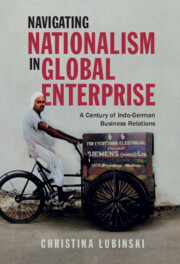Book contents
- Navigating Nationalism in Global Enterprise
- Cambridge Studies in the Emergence of Global Enterprise
- Navigating Nationalism in Global Enterprise
- Copyright page
- Dedication
- Contents
- Figures
- Tables
- Acknowledgments
- Introduction
- Part I Nationalism and Competitive Dynamics
- 1 The Invention of Nationality
- 2 Bazaar Goods “Made in Germany”
- 3 Mapping Enemies in World War I
- 4 The Alliance of the Disillusioned
- Part II Emergent Strategy in a World of Nations
- Conclusion: Rehistoricizing Nations
- Appendices
- Bibliography
- Index
3 - Mapping Enemies in World War I
from Part I - Nationalism and Competitive Dynamics
Published online by Cambridge University Press: 27 October 2022
- Navigating Nationalism in Global Enterprise
- Cambridge Studies in the Emergence of Global Enterprise
- Navigating Nationalism in Global Enterprise
- Copyright page
- Dedication
- Contents
- Figures
- Tables
- Acknowledgments
- Introduction
- Part I Nationalism and Competitive Dynamics
- 1 The Invention of Nationality
- 2 Bazaar Goods “Made in Germany”
- 3 Mapping Enemies in World War I
- 4 The Alliance of the Disillusioned
- Part II Emergent Strategy in a World of Nations
- Conclusion: Rehistoricizing Nations
- Appendices
- Bibliography
- Index
Summary
World War I sanctioned the economic rivalry between Germany and Great Britain by officially declaring the Germans political “enemies.” This created new lines of distinction in India, when the newly defined enemies were shunned from social clubs and saw their assets expropriated. German businessmen were rounded up in internment camps, supervised by Indian soldiers – a fact that challenged the (perceived) cohesion of the group of “white Western Europeans” in India. While many Indian nationalists supported Britain during the war, some took the war as an opportunity for rebellion and found support for their revolutionary aspirations in Germany. While the Indo-German conspiracy schemes during the war yielded few immediate results, they had a number of longer-term consequences, such as Germans and Indians openly reflecting on their joint interests and complementary ambitions, nationalistic Indians physically settling (and remaining) in Berlin to collaborate with German political and economic leaders, and the launch of targeted publications promoting the Indo-German alliance.
Keywords
- Type
- Chapter
- Information
- Navigating Nationalism in Global EnterpriseA Century of Indo-German Business Relations, pp. 75 - 94Publisher: Cambridge University PressPrint publication year: 2022

